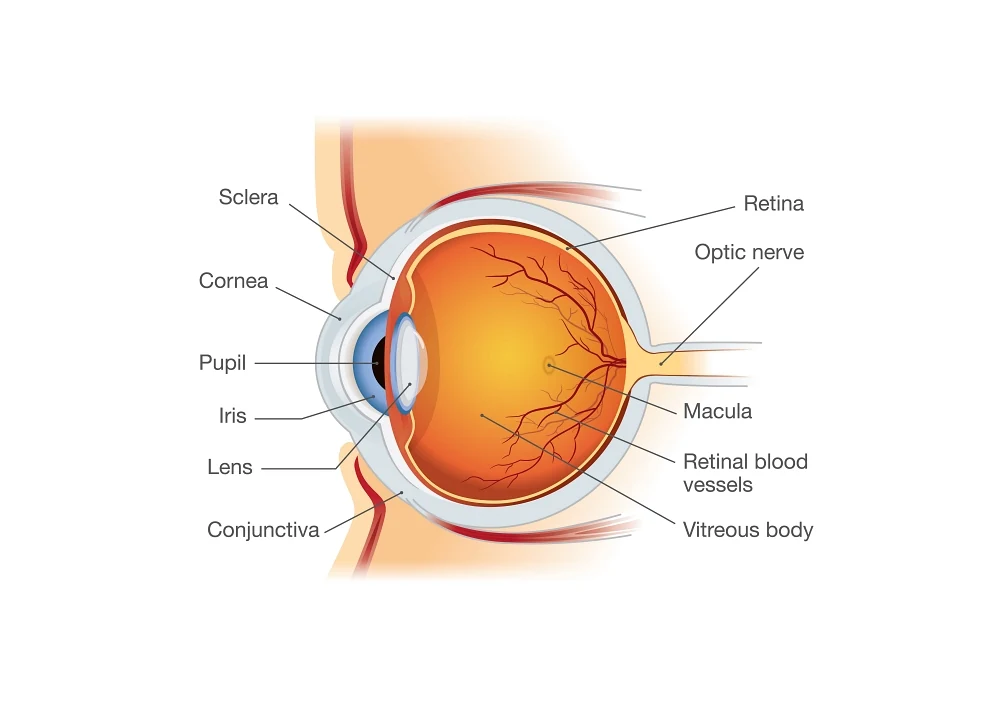
Understanding the Retina
The retina is a layer of photosensitive cells that lines the back wall of the eye, separated by the lens of the eye by a jelly-like element called the vitreous. When light is focused, or refracted, by the eye’s lens, the retina processes this light. Signals are then sent to the optic nerve to produce the images we see. At the center of the retina lies the macula, which contains many of the light-sensing cells that help us detect fine details and color.1
Macular Degeneration
Age-related macular degeneration (AMD) is a progressive condition that is caused by a thinning of the macula. Macular degeneration is the most common cause of age-related vision loss and can cause loss of central vision, distorted vision, blind spots, and changes in the way colors are seen.2
Retinal Detachment
Retinal detachment is a medical emergency that is caused by the retina separating from the wall of the eye. If your peripheral vision suddenly grows dark or you experience shadows in your visual field or a sudden increase in flashers and/or floaters, call us immediately.3
Retinal Tear
Retinal tears may be caused by aging, trauma, or injury to the eye. A retinal tear may lead to retinal detachment if not treated promptly and may cause similar symptoms such as shadows or flashers and floaters.4
Macular Hole
Aging or eye trauma can cause the vitreous to pull away from the retina, and this can result in a macular hole. Symptoms of a macular hole may include blurry central vision, straight lines appearing wavy, and other visual disturbances. Vitrectomy is performed as a treatment for macular holes.5
Macular Pucker
With age, the vitreous can begin to shrink. This may lead to the formation of scar tissue, which can cause the macula to pucker or wrinkle. A macular pucker can cause distorted or disturbed vision, and sometimes requires surgical treatment.6
Cystoid Macular Edema
When the macula swells or becomes inflamed, it may result in cystoid macular edema. This can lead to a loss in central vision. Common treatments for cystoid macular edema include surgery, injections, and anti-inflammatory eye drops.

Diabetic Retinopathy
Patients with diabetes are susceptible to diabetic retinopathy, which can cause damage to the blood vessels in the retina. There are a number of stages of diabetic retinopathy, and early treatment is the best way to avoid permanent vision loss.
Flashers and Floaters
Flashers and floaters are normal visual disturbances that affect everyone. However, a sudden increase in flashers and floaters may be a sign of a serious retinal condition and requires an examination by an experienced eye doctor.
Retinal Vein Occlusion
Retinal veins are responsible for transporting nutrients, oxygen, and blood to and from the retina. A blockage in a retinal vein can cause retinal vein occlusion (RVO), for which there is no treatment. Patients with retinal vein occlusion risk factors such as diabetes, high blood pressure, macular edema, glaucoma, or inflammatory conditions require monitoring by an experienced ophthalmologist.7
Vitreous Hemorrhage
Normally, the vitreous gel in the middle of the eye does not contain blood vessels. However, certain conditions like diabetic retinopathy, tumors, carotid artery disease, and Terson’s syndrome may cause blood vessels to grow in the vitreous. A rupture of one of these blood vessels can lead to blood within the vitreous, which may cause vision loss. Vitreous hemorrhage may be treated with a vitrectomy or retinal laser photocoagulation.
Retinal Laser Photocoagulation
Retinal Laser Photocoagulation is performed as a treatment for conditions such as retinal tears, retinal detachment, macular degeneration, and diabetic retinopathy. This minimally invasive procedure is designed to prevent or slow the growth of blood vessels in the retina or vitreous.
Vitrectomy
A vitrectomy is performed to remove the vitreous and replace it with a saline solution. A vitrectomy may be treatment for retinal detachment, retinal vein occlusion, diabetic retinopathy, macular holes, and cataract surgery complications.8
Contact Columbus Ophthalmology Associates
If you have been diagnosed with a retinal disease or condition, notice symptoms of retinal damage, or have a condition that requires regular monitoring of your retina, trust the experienced eye doctors at Columbus Ophthalmology Associates to safeguard your vision and eye health. Please contact us today to schedule a consultation with an ophthalmologist who is qualified to diagnose and treat retinal diseases. We are proud to serve patients from Columbus, Dublin, and surrounding communities.
1 American Academy of Ophthalmology. Retina. Available: https://www.aao.org/eye-health/anatomy/retina-103. Accessed October 15, 2022.
2 National Eye Institute. Age-Related Macular Degeneration (AMD). Available: https://www.nei.nih.gov/learn-about-eye-health/eye-conditions-and-diseases/age-related-macular-degeneration. Accessed November 15, 2022.
3 National Eye Institute, Retinal Detachment. Available: https://www.nei.nih.gov/learn-about-eye-health/eye-conditions-and-diseases/retinal-detachment. Accessed November 15, 2022.
4 American Society of Retinal Specialists. Retinal Tears. Available: https://www.asrs.org/patients/retinal-diseases/26/retinal-tears. Accessed November 15, 2022.
5 American Society of Retinal Specialists. Macular Hole. Available: https://www.asrs.org/patients/retinal-diseases/4/macular-hole. Accessed November 15, 2022.
6 National Eye Institute. Macular Pucker. Available: https://www.nei.nih.gov/learn-about-eye-health/eye-conditions-and-diseases/macular-pucker. Accessed November 15, 2022.
7 American Society of Retinal Specialists. Central Retinal Vein Occlusion. Available: https://www.asrs.org/patients/retinal-diseases/22/central-retinal-vein-occlusion. Accessed November 15, 2022.
8 American Academy of Ophthalmology. What is Vitrectomy? Available: https://www.aao.org/eye-health/treatments/what-is-vitrectomy. Accessed November 15, 2022.
